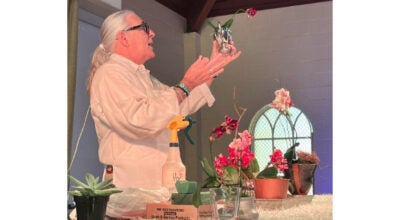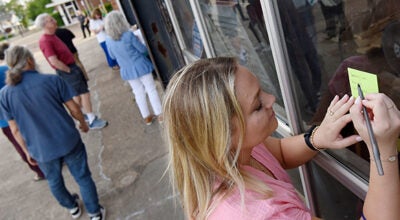Sales tax break helps area churches with bills
Published 12:15 am Sunday, August 5, 2012

Ben Hillyer/The Natchez Democrat — Glenn Switzer of G & R Construction works to install three ceiling fans in the Parkway Baptist Church choir room to help keep the room temperate without having to overstress the church’s air conditioners.
NATCHEZ — Christian theology teaches that the worship of God is not a matter of personal comfort, but still, who wants to attend a church with no air-conditioning when temperature indexes are in the triple digits?
Mary Flowers, business manager at St. Mary Basilica, said the equation is simple enough.
“Our parishioners are happier when we are cool,” she said.
But cooling — and heating — churches presents special challenges. By design, they’re buildings that have both small, dedicated spaces and at least one very large room, usually with a high ceiling, that is intended to accommodate dozens if not hundreds of people.
Business managers at some of the area’s larger churches say that can mean utility bills that range from $1,500 to $2,000 a month.
Like a burst of cool air, however, financial relief may be on the way for Mississippi’s churches bogged down with sky-high power bills this month.
House bill 562, which was passed during the Legislature’s regular session and went into effect July 1, exempts churches from paying sales taxes on their utility bills, including electricity, power, natural gas, liquefied petroleum gas or other heating fuel and potable water.
The exemption is not provided automatically. Qualified churches have to file an affidavit with the Mississippi Department of Revenue to claim the exemption. The affidavit can be found online at www.dor.ms.gov/docs/sales_AffidavitChurch.pdf.
Sales tax rates in Adams County are set at 7 percent. For a church with a $2,000 monthly power bill, that’s a $140 break on their bill.
Flowers said once she learned of the tax exemption, she filed the proper papers right away. In addition to having to cool the church rectory, the Catholic Charities building and the basilica itself, St. Mary will also soon begin using its new family life center on Main Street.
“When I think about our utilities, I am amazed at how low they are for the number of buildings we heat and cool,” she said.
At St. Mary and other area churches, keeping those bills down is a priority, because the money given to them can be better spent on the churches’ primary goals, church leaders said.
“Every little bit counts, and if we are not paying an electric bill or having to pay that money in taxes, we can use it for more of our mission of reaching the people for the gospel,” said the Rev. Jason Cole, associate pastor at Parkway Baptist Church.
That means always evaluating everything that happens in the church not only on the merits of its eternal value, but also on its value to the power company. For example, Cole said the air conditioning units hooked into Parkway’s main sanctuary are original to the building, which was built in the 1970s, and aren’t as energy efficient as they could be.
“When we plan an event or an activity, we have to think about where that is in the facility, and we make sure that the event fits the size of the room so we are not putting 10 people in the sanctuary, running four huge units to cool it for 10 people,” Cole said.
Likewise, Flowers said that even though St. Mary Basilica is open during the day for self-guided tours or people seeking a quiet place for prayer, the main church is not cooled outside of when it is being used for sacramental purposes.
“Our heating, vent and air-conditioning system is really operated by computer, and we can go in and set the time intervals that we heat and cool an area, and Father (David) O’Connor is extremely conservative with the utilities,” Flowers said. “It is set on a weekly basis for our services, and if there is a wedding or a funeral.”
Cole said Parkway has recently acquired two thermostats that can be programmed from the Internet so different parts of the church can be heated or cooled on a schedule.
“We are trying to use that in a scheduling manner so somebody doesn’t go up there and end up with the thermostat running a unit for two days without anybody knowing about it or being there,” Cole said.
Renae Loy, who serves as children’s’ pastor at Crosspoint Church, said the church budgets ahead of time for the summer months for the cost of keeping the church’s 30,000-square foot comfortable.
This year, the church has also moved some of its classes and Bible studies to other areas within the church to conserve power by running only one air-conditioning unit instead of two.
“We turn off everything we can turn off when we leave, and we try to leave some fans running just to keep air moving and make sure we don’t have any stagnation or mildew,” Loy said.
“It’s hard to do ministry when you struggle with those high rates on everything.”
The thought that churches might not be able to fully meet their mission is a sad one, Loy said.
“This is money God has entrusted to us through the goodness and giving spirits of the people in our church, and we want to be really responsible about it, and we want our money to go to mission, to educating and equipping our people,” Loy said. “We don’t want to have to cut out any ministry opportunity because we feel like we can’t pay our bill.”
And that’s why the sales tax break might not just be a gift from Jackson, but from Heaven.
Because when it’s God’s money, every nickel counts.





